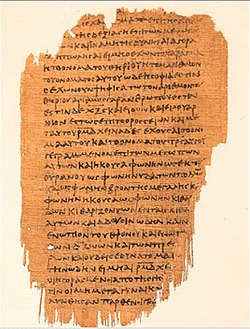Top Qs
Timeline
Chat
Perspective
Revelation 16
Chapter of the New Testament From Wikipedia, the free encyclopedia
Remove ads
Revelation 16 is the sixteenth chapter of the Book of Revelation or the Apocalypse of John in the New Testament of the Christian Bible. The book is traditionally attributed to John the Apostle,[1][2] but the precise identity of the author remains a point of academic debate.[3] This chapter describes the seven bowls, vials[4] or phials[5] of God's wrath,[6] poured out on the wicked and the followers of the Antichrist after the sounding of the seven trumpets,[7] on the command of "a loud voice from the temple" heard by the author.[8]
Remove ads
Text
The original text was written in Koine Greek. This chapter is divided into 21 verses.
Textual witnesses
Some early manuscripts containing the text of this chapter are among others:[9][a]
- Papyrus 47 (3rd century; complete)
- Codex Sinaiticus (330-360)
- Codex Alexandrinus (400-440)
- Codex Ephraemi Rescriptus (ca. 450; extant verse 1-12)
- Papyrus 43 (6th/7th century; extant verse 1-2)
Old Testament references
New Testament references
Remove ads
The seven bowls (16:1–21)
Verse 1
- Then I heard a loud voice from the temple saying to the seven angels, "Go and pour out the bowls of the wrath of God on the earth."[8]
- "From the temple": from the words in Biblical Greek: ἐκ τοῦ ναοῦ, romanized: ek tou naou, "from the temple", or "from the sanctuary",[12] do not appear in some ancient versions, and Tischendorf omitted them from his critical edition. German Protestant theologian Heinrich Meyer argues that the inclusion of these words "is guaranteed by A, C, א, and some other manuscripts, "and is entirely suitable".[13]
Remove ads
The fourth bowl (16:8–9)
Verse 8
- And the fourth angel poured out his vial upon the sun; and power was given unto him to scorch men with fire.[14]
- "Men": from Biblical Greek: ἄνθρωπος, romanized: anthrōpos in generic use refers to 'both men and women'.[15]
Verse 9
- And men were scorched with great heat, and blasphemed the name of God, which hath power over these plagues: and they repented not to give him glory.[16]
- "Men": from Biblical Greek: ἄνθρωπος, romanized: anthrōpos in generic use refers to 'both men and women'.[17]
The sixth bowl (16:12–16)
Verse 12
- Then the sixth angel poured out his bowl on the great river Euphrates, and its water was dried up, so that the way of the kings from the east might be prepared.[18]
- "From the east": translated from the Greek phrase with literal meaning "from the rising of the sun" here in the sense of 'a geographical direction' (cf. Revelation 7:2; 16:12; 21:13).[19]
Verse 16
- And they gathered them together to the place called in Hebrew, Armageddon.[20]
- "Armageddon": identified with Har-megiddo, "the mountain of Megiddo", which may refer to 'the slaying of Josiah in the valley of Megiddo', which 'became proverbial for any great sorrow' (2 Chronicles 35:22; 2 Chronicles 35:25; Zechariah 12:11) or 'to the slaughter of Sisera's army at the waters of Megiddo', by Barak, (Judges 5:19).[21]
Remove ads
See also
Notes
- The Book of Revelation is missing from Codex Vaticanus.[10]
References
External links
Wikiwand - on
Seamless Wikipedia browsing. On steroids.
Remove ads

